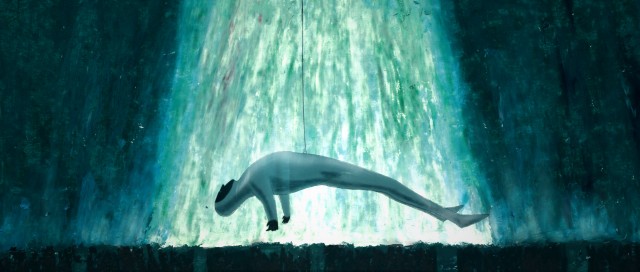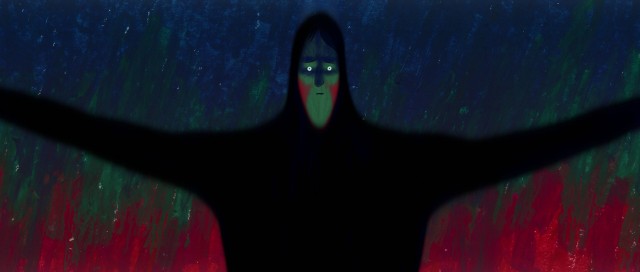When attending an opera you expect the performances on-stage to be filled with emotion and melodrama, but what is happening behind the scenes might be even more dramatic! In Fall of the Ibis King, a love triangle creates a growing tension between stage actors as they carry out their performances. Directors Mikai Geronimo and Josh O’Caoimh spin a gripping tale where what happens on, and off, the stage starts to blend—with tragic consequences.
Fall of the Ibis King is Geronimo and O’Caoimh’s graduation film from The National Film School in Dublin. Penned by O’ Caoimh, the concept lodged itself in his mind early. Despite coming up with several ideas for what would be their school capstone he notes that, “this concept really stuck with me and I kept finding myself coming back and developing it further.” Inspired by the theater, especially the possibilities it provided them from an animation perspective, O’Caoimh’s writing became influenced by psychological works that blur the lines between performance and life, such as Black Swan, Mephisto (1981), and A Double Life (1947).

“The film uses digital hand drawn character animation on top of oil pastel backgrounds.” – the directorial duo discuss their production methods
The parallels in Fall of the Ibis King are clear—the film depicts the relationship between the three characters. As actors, when they are performing, their dynamic is led by the emotions of the opera (and we all know how dramatic that can be) but off stage, it is a love triangle that introduces just as much drama into their “real” lives. These two tensions, on stage and off, start blending into one another as the film progresses. The directors shared with us that their “…intention was to explore the intimate breakdown of a relationship between three characters in an overtly fantastical manner.”
The tragic melodrama that results, drawing from touchstones like Othello, is incredibly captivating as bottled-up feelings burst out. Pacing the film to the performance on the stage heightens the dramatic tone while also creating an unsettling feeling for the audience, a fear that the tragedy of the material might follow the actors to their real lives. It is a love story, what can be more dramatic, and universal, but playing with the structure of an opera makes the film all the more compelling.

“The characters are coloured digitally by hand frame by frame to blend with the backgrounds.” – directors O’Caoimh & Geronimo discuss creating the final look of their film.
The writing and premise do not carry the film alone, however. Using different animation techniques, including hand-drawn animation for the characters and oil pastel backgrounds, the visual style of the piece powerfully supports the drama of the plot. Color is a powerful tool, and used to underscore the tone of the film throughout and how the characters’ performed bond transforms into the real thing. The music and sound design team also played a paramount role—it is an opera being performed after all—so the music is an integral storytelling tool. The score quickly immerses the audience in the world the directors created, and makes the film all the more riveting, matching the tone of the screenplay, unafraid to push and emphasize the more tragic, thus enthralling, aspect of the story.
Fall of the Ibis King had its World Premiere at the 2021 edition of Venice, where it earned a European Film Award nomination. It went on to play at multiple festivals including Seattle, Palm Springs, and picked up awards and special mentions at Clermont-Ferrand and Rhode Island. The directing duo is currently working on a miniseries titled Torpor, in development at the Irish animation studio and maps and plans (An Island, Coda) with support from Screen Ireland and a new animated short film.

 Céline Roustan
Céline Roustan